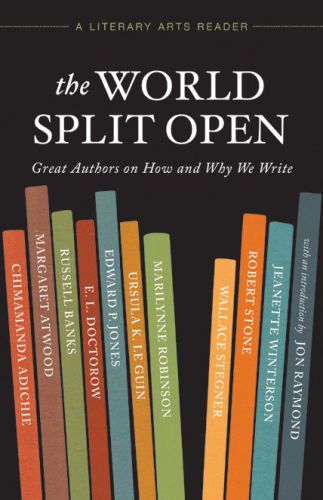
The World Split Open
Great Authors on How and Why We Write
فرمت کتاب
ebook
تاریخ انتشار
2014
نویسنده
Jeanette Wintersonناشر
Tin House Booksشابک
9781935639978
کتاب های مرتبط
- اطلاعات
- نقد و بررسی
- دیدگاه کاربران
نقد و بررسی

September 29, 2014
Marking the 30th anniversary of the nonprofit Literary Arts in Oregon, this collection of 10 lectures from celebrated writers reanimates the humanistic argument that, far from being a âmarginal cultural activity,â the production of serious literary fiction is an essential task. With eloquence, humility, and humor, contributors reflect both on their own creative processes and on literature as a whole. Trickery emerges as a common theme, with Margaret Atwood characterizing novel writing as a âkind of bank robbery,â and Wallace Stegner adding, âWeâre all practiced shape-shifters and ventriloquists.â Even so, the subjects addressed are refreshingly diverseâAtwood writes on feminism, Russell Banks on film, Chimamanda Ngozi Adichie and Edward P. Jones on their sources of inspiration, and Ursula K. Le Guin on the âmoral seriousnessâ of fantasy, to name a few. As a whole, the essays illuminate the importance of books in widening our intellectual horizons and the struggle to bring novels and their characters to life. The beautiful language these accomplished authors employ exemplifies the unteachable quality of the true âtricks of craft.â Serious readers should find a welcome reminder in this collection that great literature emerges from a receptive mind engaged with the âunanswerable questionsâ of human character and experience.

September 15, 2014
Writers reflect on the reasons they write. Compiled from 30 years' worth of lectures first presented by Literary Arts in Portland by well-known authors, the editors of Tin House have taken the best thoughts and comments and placed them in a single anniversary edition. The volume includes commentary from E.L. Doctorow, who reflects on his childhood and the roundabout way he came to writing. Russell Banks ponders the intricate relationship between an author and a reader, where the reader not only praises the author, "that shyly offered gift," but goes on to identify the "circumstances and conditions under which the book was read." In her acerbic style, Margaret Atwood gives a detailed analysis of what a novel is not: It's not a textbook or political treatise, a how-to-survive-and-thrive-in-life guide or a musing on morality. "Novels are made of language, and language, being human is messy. In short," she writes, "the novel is ambiguous and multifaceted, not because it is perverse...but because it attempts to grapple with what was once referred to as the 'human condition.' " Far more than a compendium of dreary "this is how and why I write" essays, these force readers to re-examine the ways they interact with words. The rhythm of syllables as they play against each other on the page and the way fiction, in particular, can transport us out of the here and now helps readers gain perspective and aids in our understanding of the world. "Fiction is narrative freed from the standard of literal truth," writes Marilynne Robinson. "In effect, it is the mind exploring itself, its impulse to create hypothetical cause and consequence." Other contributors include Wallace Stegner, Ursula K. Le Guin and Chimamanda Adichie. With eloquence and grace, highly acclaimed authors ponder the complexities of the writer's life and art form.
COPYRIGHT(2014) Kirkus Reviews, ALL RIGHTS RESERVED.

























دیدگاه کاربران